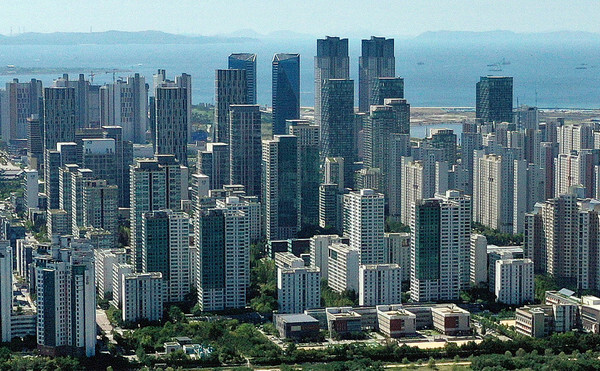
Apartments accounted for 77% of all housing transactions in South Korea last year, the highest proportion ever recorded. This indicates that for every 10 houses sold, approximately 7 to 8 were apartments. The surge in apartment sales is largely attributed to the decline in non-apartment transactions, particularly villas, due to the impact of reverse jeonse ( 전세 ) and jeonse fraud incidents.
According to the "Housing Type-Specific Transaction Status" data compiled by the Korea Real Estate Board on the 17th, there were 642,576 housing transactions nationwide last year. Among these, apartment transactions amounted to 492,052 units, representing 76.6% of the total. The transaction volume of multi-family housing units was the second highest at 75,943 units (11.8%), followed by detached houses (7.5%), row houses (2.9%), and multi-household houses (1.2%).
The proportion of apartment transactions last year was the highest since 2006 when the Korea Real Estate Board began compiling relevant statistics. The share of apartments in housing transactions ranged from the mid-60% to early 70% range before soaring to 73.0% in 2020 during a period of rapid house price increases. The proportion of apartment transactions decreased to 65.9% in 2021 and further dropped to 58.7% in 2022 when the real estate market cooled down and housing transactions were halved.
However, in 2023, as the transaction volume of villas (다가구 , 다세대 , 연립 ) plummeted by 34% from 142,000 units in the previous year to 93,000 units due to the reverse jeonse and jeonse fraud crisis, the proportion of apartment transactions rose again to 74.2%. Last year, the transaction volume of villas recovered to 204,000 units, reaching the level of 2021 (241,000 units) before the jeonse fraud crisis. Nevertheless, the proportion of apartment transactions reached a record high as the transaction volume of apartments increased by 19.5% compared to the previous year.
The proportion of apartment transactions was much higher in the provinces than in Seoul. In Seoul, the proportion of apartments in housing transactions last year was 62.4%, the highest figure ever recorded. On the other hand, there are many provincial cities where the proportion of apartment transactions already exceeds 90%. Last year, among the 27,663 housing transactions in Daegu, 90.5% (25,027 units) were apartments, and in Gwangju, 90.5% (16,740 units) of the 18,497 transactions were also apartments.
In the case of Sejong, apartments accounted for 96.3% of housing transactions. Ulsan (89.5%), Daejeon (82.5%), Gyeongnam (81.9%), and Busan (81.3%) also had apartment transaction proportions exceeding 80%. In these areas, there were hardly any housing transactions other than apartments. Experts predict that the " 편식 현상 " of focusing solely on apartments for transactions may intensify further.
[Copyright (c) Global Economic Times. All Rights Reserved.]



























